完整7Bunit2广州深圳沪教版牛津英语七年级下册教案
七年级英语牛津版7B Unit 教案及配套作业
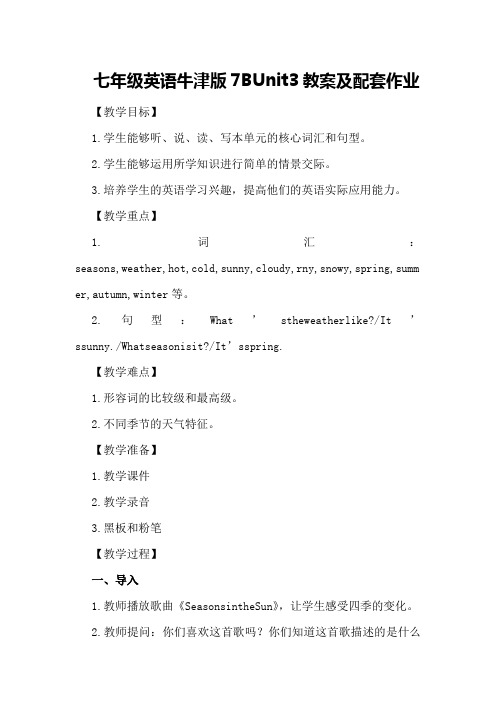
七年级英语牛津版7BUnit3教案及配套作业【教学目标】1.学生能够听、说、读、写本单元的核心词汇和句型。
2.学生能够运用所学知识进行简单的情景交际。
3.培养学生的英语学习兴趣,提高他们的英语实际应用能力。
【教学重点】1.词汇:seasons,weather,hot,cold,sunny,cloudy,rny,snowy,spring,summ er,autumn,winter等。
2.句型:What’stheweatherlike?/It’ssunny./Whatseasonisit?/It’sspring.【教学难点】1.形容词的比较级和最高级。
2.不同季节的天气特征。
【教学准备】1.教学课件2.教学录音3.黑板和粉笔【教学过程】一、导入1.教师播放歌曲《SeasonsintheSun》,让学生感受四季的变化。
2.教师提问:你们喜欢这首歌吗?你们知道这首歌描述的是什么季节吗?二、新课讲解1.教师展示四季的图片,引导学生说出每个季节的特点。
2.教师教授核心词汇,让学生跟读并模仿发音。
3.教师讲解形容词的比较级和最高级,让学生举例说明。
4.教师展示句型,让学生模仿并进行情景对话。
三、课堂练习1.学生两人一组,用所学句型和词汇进行对话。
2.教师选取几组学生进行展示,给予评价和指导。
四、小组活动1.学生分成小组,讨论四季的天气特征。
2.每组选代表进行汇报,其他小组成员进行补充。
五、作业布置1.听写本单元的核心词汇。
2.完成练习册上的相关题目。
【课后作业】一、听力练习1.听录音,完成听力练习。
2.根据听力材料,回答相关问题。
二、口语练习1.与同伴进行对话,练习本单元的句型和词汇。
2.录制自己的对话,分享到班级群。
三、书面练习1.根据本单元所学,写一篇关于四季的短文。
2.仿照课文,编写一个关于天气的小故事。
四、拓展阅读1.阅读课文,理解文章大意。
2.根据课文内容,回答相关问题。
【教学反思】本节课通过歌曲导入,激发学生的学习兴趣。
牛津英语7BUnit2 Welcome to the unit&comic strip
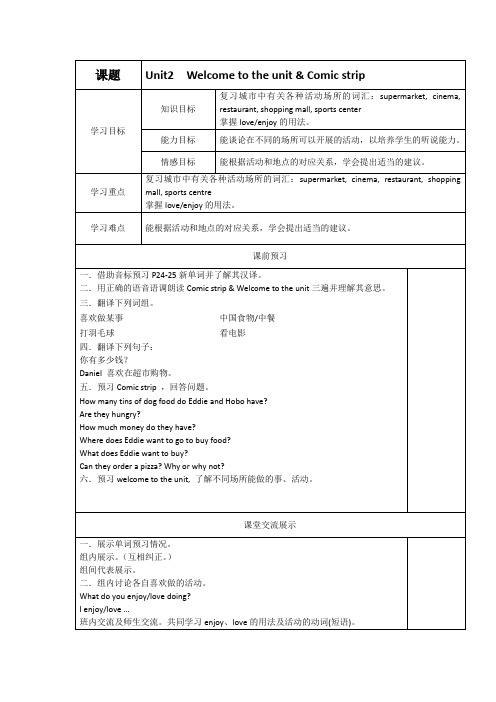
能根据活动和地点的对应关系,学会提出适当的建议。
学习重点
复习城市中有关各种活动场所的词汇:supermarket, cinema, restaurant, shopping mall, sportscentre
掌握love/enjoy的用法。
学习难点
能根据活动和地点的对应关系,学会提出适当的建议。
课题
Unit2Welcome to theunit & Comic strip
学习目标
知识目标
复习城市中有关各种活动场所的词汇:supermarket, cinema, restaurant, shopping mall, sportscenter
掌握love/enjoy的用法。
能力目标
能谈论在不同的场所可以开展的活动,以培养学生的听说能力。
四.完成书P25 A和B部分。
组内核对,班内展示。
五.展示comic strip部分的问题答案。
小组分角色朗读并表演Comic strip部分对话。
七.组内讨论合作仿照漫画的对话编写新的对话并做小组展示。
巩固训练
一.词语翻译:
1.喜欢看电影________________
2.多少钱______________
三.动词填空: (18分)
1.Would you like__________(go) to the sportscentrewith me?
2.I __________ (go) to school at 7:30 a.m. and my mother __________(go) to work a little earlier.
Ienjoy/love…
班内交流及师生交流。共同学习enjoy、love的用法及活动的动词(短语)。
7Bunit7最新广州、深圳沪教版牛津英语七年级下册教案
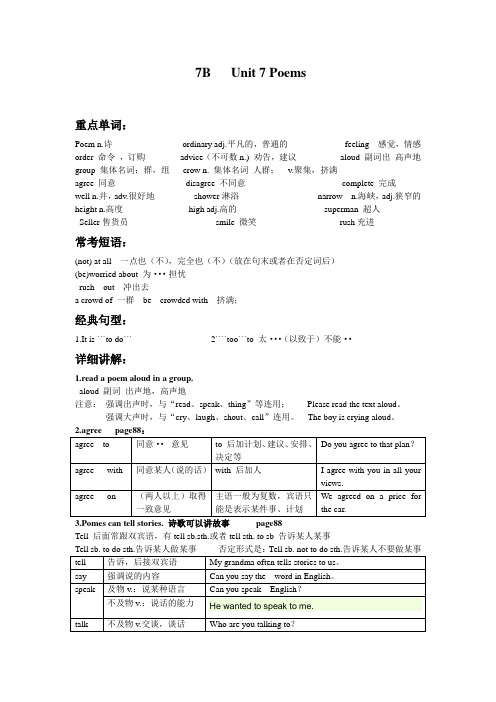
7B Unit 7 Poems重点单词:Poem n.诗ordinary adj.平凡的,普通的feeling 感觉,情感order 命令,订购advice(不可数n.) 劝告,建议aloud 副词出高声地group 集体名词:群,组crow n. 集体名词人群;v.聚集,挤满agree 同意disagree 不同意complete 完成well n.井,adv.很好地shower淋浴narrow n.海峡,adj.狭窄的height n.高度high adj.高的superman 超人Seller售货员smile 微笑rush充进常考短语:(not) at all 一点也(不),完全也(不)(放在句末或者在否定词后)(be)worried about 为···担忧rush out 冲出去a crowd of 一群be crowded with 挤满;经典句型:1.It is ```to do``` 2````too```to 太···(以致于)不能··详细讲解:1.read a poem aloud in a group.aloud 副词出声地,高声地注意:强调出声时,与“read、speak、thing”等连用;Please read the text aloud。
强调大声时,与“cry、laugh、shout、call”连用。
The boy is crying aloud。
3.Pomes can tell stories. 诗歌可以讲故事page88Tell 后面常跟双宾语,有tell sb.sth.或者tell sth. to sb 告诉某人某事语法:祈使句和感叹句一、祈使句(一)教材例句1.Open the door, Daisy.2.Don't be late again.以上的两个句子没有主语,表示命令或建议,这样的句子是祈使句。
牛津译林初中英语七下Unit 2 Neighbours教案3
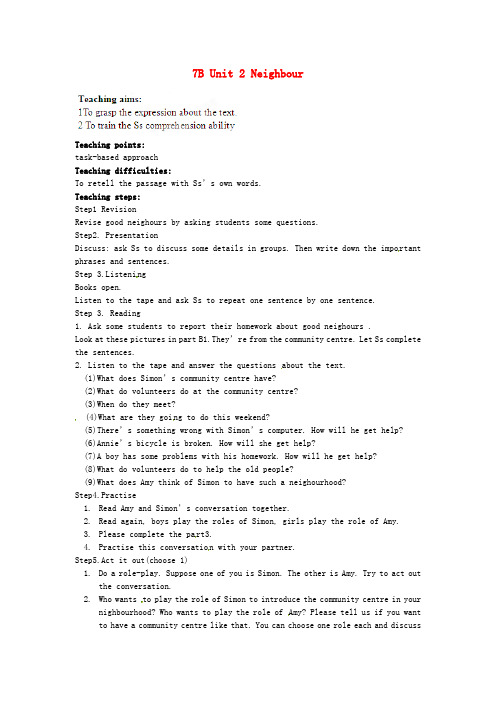
7B Unit 2 NeighbourTeaching points:task-based approachTeaching difficulties:To retell the passage with Ss’s own words.Teaching steps:Step1 RevisionRevise good neighours by asking students some questions.Step2. PresentationDiscuss: ask Ss to discuss some details in groups. Then write down the impo rtant phrases and sentences.Step 3.Listeni ngBooks open.Listen to the tape and ask Ss to repeat one sentence by one sentence.Step 3. Reading1. Ask some students to report their homework about good neighours .Look at these pictures in part B1.They’re from the community centre. Let Ss complete the sentences.2. Listen to the tape and answer the questions about the text.(1)What does Simon’s community centre have?(2)What do volunteers do at the community centre?(3)When do they meet?(4)What are they goi ng to do this weekend?(5)There’s something wrong with Simon’s computer. How will he get help?(6)Annie’s bicycle is broken. How will she get help?(7)A boy has some problems with his homework. How will he get help?(8)What do volunteers do to help the old people?(9)What does Amy think of Simon to have such a neighourhood?Step4.Practise1.Read Amy and Simon’s conversation together.2.Read again, boys play the roles of Simon, girls play the role of Amy.3.Please complete the pa rt3.4.Practise this conversatio n with your partner.Step5.Act it out(choose 1)1.Do a role-play. Suppose one of you is Simon. The other is Amy. Try to act outthe conversation.2.Who wants to play the role of Simon to introduce the community centre in yournighbourhood? Who wants to play the role of Amy? Please tell us if you want to have a community centre like that. You can choose one role each and discussthis with your partner.Step nguage points1.anyone pron. used instead of someone in negative sent ences and in questions.2.broken adj. has been damaged or injured, no longer whole or wokingcorrectly.3.check vt. to examine sth to see if it is correct, safe or satisfactory .Youshould check your homework before handing it in .4.college n. a university where students can study for a degree after theyhave left high school.eg.Lil y is going to visit some famous colleges in Beijing during this summer holiday.munity n. a group of people living in particular local area. In mycommunity, we have a lot of activities at weekends.6.Engineer n. a person whose job is to design and build engines, machines,roads, bridges, etc.eg.My cousin wants to be an engineer when he grows up.7.fix vt. to repair or correct sth.eg. The car won’t start---can you fix it?。
完整word完整word版7Bunit5广州深圳沪教版牛津英语七年级下册教案

完整word完整word版7Bunit5广州深圳沪教版牛津英语七年级下册教案7B Unit 5 Water重点单词:Drop n.滴,v.落下Chemical 化学制品Vapour 蒸汽Journey n.旅程Through 穿过,通过Form 形成Quantity 数量Pipe 管,烟斗Stir 搅拌Quality质量Valuable adj.宝贵的,很有用Continue 继续Experiment n.实验Bit 少量Crystal 水晶,结晶Fresh adj.新鲜的Bank 银行reservoirSalt 盐蓄水池V oice 声音Change 不可数n. 找给的Add 增加Return 归还,回到重点短语:turn off 关闭part of 部分Turn into (使)变成pocket money 零花钱Add...to...把···加入(be) made up of 由··组成a bit 有点儿(要加上of才可以修饰不可数dry up干涸名词)重点句型:1.Then it was time for sb. to ...到了做某事的时候了(page59)2.Remember not to...3.How much water is there...?4.How much bottles of water are there...?详细讲解:1.Listen to a story about the journey of a coin.(page57)2.when you exercise,you need more water.(page58)Exercise①为不及物动词,是“锻炼”的意思。
②可数名词:练习,体操③不可数名词:锻炼,运动3.two thirds.三分之二(page58)英语中的分数表示:分子用基数词,分母用序数词。
牛津译林版英语七下7B_Unit_2_Neighbours教案
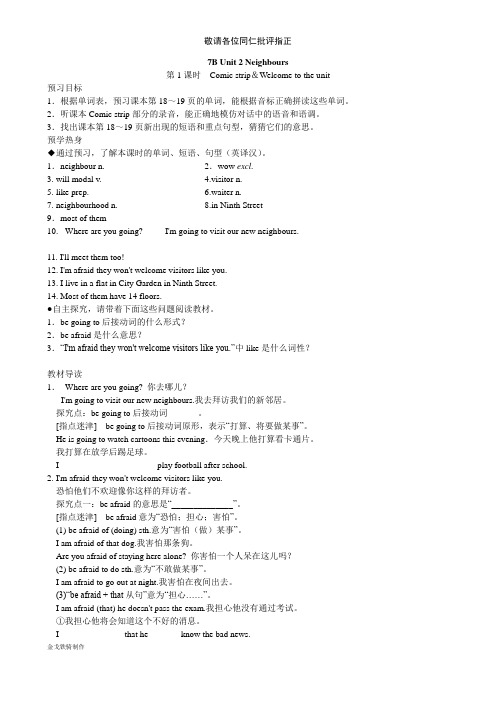
7B Unit 2 Neighbours第1课时Comic strip&Welcome to the unit预习目标1.根据单词表,预习课本第18~19页的单词,能根据音标正确拼读这些单词。
2.听课本Comic strip部分的录音,能正确地模仿对话中的语音和语调。
3.找出课本第18~19页新出现的短语和重点句型,猜猜它们的意思。
预学热身◆通过预习,了解本课时的单词、短语、句型(英译汉)。
1.neighbour n. _______ 2.wow excl._______3. will modal v._______4.visitor n._______5. like prep._______6.waiter n._______7. neighbourhood n._______ 8.in Ninth Street_______9.most of them_______10. - Where are you going? - I'm going to visit our new neighbours._____________________________________________________________________11. I'll meet them too! ________________________________________________________12. I'm afraid they won't welcome visitors like you.___________________________________13. I live in a flat in City Garden in Ninth Street.___________________________________14. Most of them have 14 floors.________________________________________________●自主探究,请带着下面这些问题阅读教材。
牛津版七年级英语下册7B Unit2 教案
7B Unit2 NeighboursComic strip&welcome to the unitI Teaching aims1.Get the Ss to know jobs and names of working places.2Talk about the neighborhoods they live in in English.3Talk about the activities and life in your neighborhoods in English.II. Teaching difficulties and empires1.Have a discussion in class, and talk about the jobs they know.2.To talk about the neighborhoods they live in.3.To discuss the neighborhoods they like.III. Teaching stepsStep1. Lead-inGet the Ss to answer the following questions..(导入新课)Where do you live? What kind of home do you live?Is your home near a park/a school/a restaurant/a supermarket?(Encourage the students to answer these questions according to the fact. If they are good at English, encourage them to introduce their)Step2 Presentation1.Have a further talk with students about their neighbourhood and present new knowledge. ( 学习生词neighbour, neighbourhood.)Teacher says: Who lives next to your flat/ house? Who lives above/ below you? Who’s your neighbour? What’s your neighbour’s name? What does he/ she do? Write down neighbour and neighbourhood on the Bb and present them.2.Show some pictures and present different jobs and names of working places. (复习询问职业的三种句式)Step3. Practice1.Get the students to finish Part A on P19.Teacher says: We have a lot of neighbours. They have different jobs. Look at the pictures. Where do they work? Please match them with the places.2. Check the answers with the whole class.3.Get the Ss to talk with their classmates about their neighbours in groups of two. Teacher can give the Ss a model. (帮助学生用已有的知识根据实际情况回答,巩固所学知识)Step 4. Presentation1.Lead-in Part B, guide the Ss to understand the dialogue. Amy is asking Simon some questions . What are these questions about? Please listen to the tape and tell them.2. Listen to the tape and answer questions.3. Listen to the tape and read after it.4. Read the dialogue freely and answer more questions.1).Where does Simon live?2).How many buildings are there in his neighbourhood?3).What do they have around their neighbourhood?4) What does Simon think of his neighbourhood?5.Divide the Ss into two groups and read the dialogue.6 Work in pairs and make up your own conversation about your neighbourhood.Step 5 Presentation1.Have a free talk with Ss and present new words. Such as, visitor , like , .2.Present Comic strip , listen to the tape and answer a question .Where is Hobo going?(听录音回答问题,检查听力效果)3.Read after the tape and answer more questions.Where does Eddie do when he visits his neighbour?4.Present languages.Step 6 Practice1.Read the dialogue in pairs.2.Act out the dialogue.3.Encourage Ss to talk about Comic strip. EG.. Do yo u think Eddie’s new neighbours welcomehim? Why or why not? If you have a neighbour like Eddie, do you welcome him?(检查学生学习及应用所学语言能力和表达能力)4.Finish some Exs.Step7 .Sum-upGo through the new words and the language points learn during this lesson.1. What’re the meanings of these words?waiter, doctor, teacher, nurse,student, cook2. Pay attention to these sentence patterns.I’m afraid …How many … are there?It’s good to …Step8 Homework1.Review the contents of this lesson.2.Write a conversation between you and one of your friends. You can talk about your neighbourhood.Unit 2 NeighboursReading (Ⅰ)Teaching aims:● To learn about Simon’s neighbours●To infer meaning from keywords, context and existing knowledge●To understand a series of events and simultaneous actions.●To paratise the students’ abilities of reading and comprehension.Teaching Procedures:Step 1 DiscussionAsk the students to talk about their neighbours by answering the following questions.1. Where do you live?2. How many buildings are there in your neighbourhood?3. What do you have around your neighbourhood?4. Do you like living there?5. Do you often help your neighbours?6. What are your neighbours like?(本环节旨在导入Reading 的话题,同时又训练了学生的口语。
牛津译林初中英语七下Unit 2 Neighbours教案6
7B Unit 2 Neighbour教学内容掌握单词 future/ polic e station/ job/ post/ artist/ sound/ stick句型①What are you going to be in the future?②I’m going to be a computer e ngineer.教学工具:多媒体Revision: Answer the questionsHow ma ny people are there in Wendy’s ho me?What’s Wendy’s father?Where does Wendy’s mother work?How does her sister go to work?二、Presentation1, Show some pictures to introduce some jobs. And l et students discuss, lead to the topic.Teacher says: look at these jobs. Are they interesting? Which is your favourite? Students answer with their own information.Teacher says: oh, I see, ……is going to be……in the future.Write down on the blackboard: “Future and this sentence”In the same way, show an artist with colourful chalk.2, PracticeTeacher says, Millie is talking with her classmates about their future jobs. Listen to the conversation and do “true or false” exercises.1) Daniel likes computerMillie is going to be a computer engineer.Sandy is going to be a teacher.Amy is going to be a doctorSimon is going to be a basketball star.2) listen to the tape again, then read after the teacherPlease open your books and repeat afte r the tape. Sentence by sentence, if need read more.四.PresentationLook at some phrases : an apple ,stand up ,in an hour teacher read these phrases, le t Ss pay attention to the pronunciation what’s the difference among them.1 We usually link a consonant with a vowel sound.2.When the first word end s –r or –re and the next word begins with a vowel sound, we join them together with a /r/ sound between them3.When there re two vowel sounds, we join them as if there were a /j/ or /w/sound between them.4.When two consonant of two words meet, we sometimes do not need to pronounce the first consonant sound .二. PracticeListen to the tape about them. Please work in pairs .read them to your partner.In a minute fall in the riverTell us story take care of it work at it in an office三.Homework。
牛津英语7B Unit 2课本知识整理(word版)
7B Unit 2 NeighboursWarm up一、重点单词1. neighbour n. 邻居2. visit v. 拜访;参观3. meet v. 遇见;会面4. afraid v. 害怕5. visitor n. 拜访者;参观者6. neighbourhood n. 街区;居民区7. discuss v. 讨论8. like prep. 像,类似;...怎么样二、重点词组1. be afraid of... 害怕...2. help each other 互相帮助三、重点句型1. --- Where are you going? 你打算去哪儿?--- I’m going to ... 我打算去...2. I’m afraid they won’t welcome visitors like you. 恐怕他们不会欢迎像你这样的访客。
Welcome to the unit一、重点单词1. below adv. 下面2. flat n. 公寓3. cook n. 厨师/ v. 煮菜4. building n. 建筑5. floor n. 层6. supermarket n. 超市7. restaurant n. 餐厅8. hospital n. 医院二、重点词组1. ask sb. about sth. 问某人关于某事2. talk about sth. 谈论关于某物3. in Ninth Street 在第九大街4. live in a flat 住在一个公寓三、重点句型1. Where do you live? =Which place do you live in? 你住在哪里?2. How many buildings are there in your neighbourhood? 你居住的街区有多少建筑?3. What do you have around your neighbourhood? 你居住的街区周围有什么?4. Do you like living here? 你喜欢住在这里吗?5. It’s good to live in a neighbourhood like that. 住在像那样街区真好。
(完整word版)牛津上海七年级7BUnit2复习教案
教学过程:1. 基础知识梳理2. 重要句型及语法3. 课堂练习4. 家庭作业Part 1基础知识梳理:1.重点词汇和短语1. stupid adj. 近义词foolish, silly例: a stupid mistakea silly behavior2. robber n.强盗rob ( robbed , robbed ) v. rob a bankrob sb. of sth. 抢了某人某物robbery n. 抢劫案拓展:steal (stole, stole n )偷steal sth. from sb.小偷thief 盗窃案theft3. hate 用法同likehate to do sthhate doing sth注意两种用法之间的区别4. in space 在太空中,在于宙中space = room 空间例: Would you please leave me some space/room ? in the space 表示在… 空间里例: We can put no thi ng in the space betwee n these two desks.这两个写字台之间的空间已经不允许我们放任何东西了。
注意:in space 禾口in the space 的区另U类似的还有:in hospital生病住院in the hospital 在医院at school 上学at the school 在学校at table 在吃饭at the table 在桌旁5. duration n. 持续时间We hope the war will be of short duratio n. 我们希望战争是短期的。
during : 在…期间6. price 价格high price low price注意:price 拾配的形容词用high, low, 不用expensive, cheap7. happy a. happily ad happ in ess n (un….)8. Choose v.选择3) Shall we …?4) Let ' s ….=5) You' d better …【语法点:】Neither用法小结1. neither用作形容词,表示“两者)都不”置于单数名词之前。
- 1、下载文档前请自行甄别文档内容的完整性,平台不提供额外的编辑、内容补充、找答案等附加服务。
- 2、"仅部分预览"的文档,不可在线预览部分如存在完整性等问题,可反馈申请退款(可完整预览的文档不适用该条件!)。
- 3、如文档侵犯您的权益,请联系客服反馈,我们会尽快为您处理(人工客服工作时间:9:00-18:30)。
around the worldTravelling Unit 2 7B重点单词:Frenchman)Frenchman 法国人(复数:France n.法国French adj.法国的酒wine greeting n. 敬礼,致意,问候Flag 国旗,标志欧洲Europe possible 可能Tick 滴答声位于,撒谎lie excellent adj.卓越的,杰出的Store商店,贮存北north west 西south East 东南lift 电梯,举起滑雪ski coast n.海岸perfect 完美的stairs楼梯step n.脚步Tower 塔finish 完成address 地址date日期receive收到Town 镇重点词组) China is famous for The Great Wall。
Be famous for 以···而闻名((Jielun Zhouis famous as a singer)be famous as 作为什么而出名·一样反义词组:be the same as 和···Be different from 与··不同更加喜欢,宁愿prefer to department store 百货公司Far away from 远离去观光go sightseeing Go on holiday 去度假详细讲解:我能跳得比埃菲尔铁塔高!(page15)1.I can jump higher than theEiffel Tower! +副词比较级+thanB”higher than 副词比较级。
句型为:“A+···You study harder than me.你比我学习更努力。
如:(page15)2.Don't be silly,Lo。
别傻了,LO.这是一个祈使句,用来表示请求、命令、叮嘱、劝告等语气,主语(you)通常可以省略。
主要句型有三种:please. Listen to me,tdon'”(1)V型祈使句:以动词原形开头。
变否定句时,在句首加“Be quickly!please.be 动词开头(2)B型祈使句:以。
变否定句时,在句首加“.don't”(3)L型祈使句:Let sb.+动词原形Don't let them play football。
s play football. Let' 如:Eiffel Tower.(page17)3.Here you will find many famous places of interest such as the(1)places of interest 名胜(深圳的南头古城,龙岗大万世居、鹤湖新居,大鹏古城,龙田世居)(2)such as “例如”主要用于列举同一类人或事物中的几个例子。
(3)For example “例如”,一般只用于同一类人或事物中的“一个”为例,要用逗号隔开。
如:Most of the boys in our class like ball games.For example ,Li Hua likes football.4.The south of France lies on the coast.(法国南部坐落在海岸线上)(page17)Lie ①位于,坐落于(过去式lay )Guanlan Town lies in the north of Shenzhen.②躺,撒谎(过去式:lied) I think you're lying.我认为你在撒谎。
过去分词 lain 现在分词 lying5.by的用法:(page17)by bus)乘车,乘船2(by the window ·的旁边·)在·1(.(3)在···之前,不迟于by ten o'clock at night。
(4)表示方法,手段。
He is drawing by pencil。
6.prefer:(跟在prefer 后面的是他更喜欢的)(1)prefer sth. 更喜欢某事(2)prefer sth to sth. 比起某物更喜欢某物he prefers apple to banana。
(3)Prefer doing sth to doing sth.宁愿做某事也不愿做某事。
I Prefer playing the piano to playing football。
我还知道:Would rather+动词原形···than+动词原形···宁愿···也不愿She Would rather play the piano than play football。
(4)prefer to do sth.更喜欢做某事。
I prefer to read English in the morning。
7.try doing sth 试着做某事 You should try eating more fruit。
Try to do sth 努力去做某事 Try to get up early。
10.I learn a lot about the Ming and Qing dynasties.我学到许多关于明朝和清朝的知识。
(page22)11.Date日期(page22)询问日期时:what's the date?或者what date it is? 回答:It's July ···我们来拓展一下:询问星期几:what day it is?回答:It's Monday。
13.Backpackers usually do not spend too much money on a trip。
Grammar 连词Conjunctions连词:是一种虚词,它不能独立担任句子成分而只起连接词与词、短语与短语或句子与句子作用。
连词主要分为两类:并列连词和从属连词。
分为:表平行或对等关系的连词、表转折关系的连词、表选择关系的连词、表因关系的连词一、并列连词:1.平行或对等关系的并列连词and “和”;both…and…“……和……两个都”;as well as“也”not only…but also…“不但……而且……”; neither…nor…“既不……也不……”如:①My mother bought me a present,and I like it very much.我妈妈买了一件礼物给我,我很喜欢②He can speak not only English but also French.他会说英语还会说法语。
2.表转折关系的并列连词:but“但是”; yet“然而”;while“而”; however“然而”如: Lucy likes red while Lily likes white。
露西喜欢红的,然而莉莉喜欢白的。
3.表选择关系的并列连词:or“或者”;either…or…“要么……要么……”注:由or 连接的句子可以转换为有否定条件构成的主从复合句。
Eg:① Study hard,or you'll fail the exam.努力学习,否则你考试会失败的。
=If you don't study hard,you'll fail the exam.②Either you or he goes. “要么你去,要么他去”。
4.表因果关系的并列连词 so “所以,因此”; for “因为”Eg:①Kate was ill so she didn't go to school.凯特病了所以没去学校。
②I have to stay up,for I have lots of homework to do。
我必须熬夜,因为我有很多作业。
二、不能同时出现在一个句子中的连词。
1.because(因为),so(所以)不能同时出现在一个句子里,只能用其一.eg:Because he was tired,he couldn't walk here.因为他很累,所以走不到这里。
=He was tired,so he couldn't walk there.2.although/though(虽然),but(但是)不能同时出现在一个句子里,只能用其一。
但although/though和yet 可以同时出现在一个句子里(yet 用作副词)Eg:Though he was tired,he still worked hard.虽然他很累,但是她仍然坚持工作=He was tired,but he still worked hard.:三、and 和or 用于否定句中的区别1)当列举成分是主语,又在否定词之前时用and连接;而当列举成分在否定词之后时,用“or”构成完全否定.Eg:I can't sing or dance. 我不会唱歌,也不会跳舞。
Lucy and lily can't speak Chinese. 露西和莉莉都不会说汉语。
注意:在否定句中,如果所连接的两部分都有否定词那么用“and”而不用“or”Eg:There is no water and no air on the moon.月球上没有水也没有空气。
2) 在否定句中,without +and;而在肯定句中,without+or,构成完全否定。
Eg:Man can't live without air and water=Man will die without air or water.四、由 either……or….., neither……nor……,not only……but also……连接两个并列主语(就近原则)时,谓语动词与较近的主语保持一致。
.Not only my parents but also I am looking forward to meeting you.不止我父母,连我很也很想见到你。
